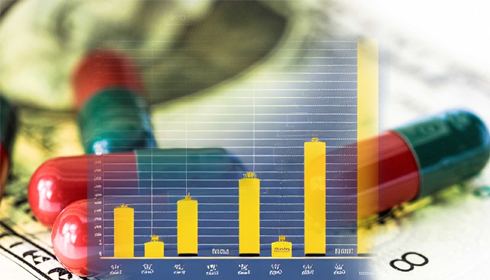
Big Pharma's greed for profit is undermining public health: Report
In recent decades, the pharmaceutical industry has experienced unprecedented growth and profitability, fuelled by advancements in medical research and technology. However, this spike in success has been accompanied by growing concerns and disputes over the ethical dimensions of large pharmaceutical corporations' actions, as US Senator Bernie Sanders led HELP Committee emphasised in its Report.
One of the most contentious issues that has emerged is the relentless pursuit of profits at the expense of public health and ethical considerations.
As Drug Today Medical Times delves into the intricate web of controversies surrounding the profit-driven strategies adopted by big pharma companies, examining their impact on healthcare accessibility, drug pricing, and the overall well-being of global populations, it becomes imperative to scrutinise the balance between business interests and the fundamental human right to health, ultimately questioning whether the quest for profits has overshadowed the industry's commitment to fostering public welfare.
In anticipation of an upcoming Senate hearing featuring CEOs from three prominent pharmaceutical giants, Senator Bernie Sanders, I-Vermont, has released a scathing report that unveils the dubious system allowing these companies to impose higher drug prices in the United States compared to any other nation.
The Senate Committee on Health, Education, Labour, and Pensions (HELP) orchestrated the report, which strategically focuses on the three companies that will be scrutinised during the upcoming hearing: Bristol Myers Squibb, Johnson & Johnson, and Merck & Co. represented by CEOs Chris Boerner, Joaquin Duato, and Robert Davis, respectively.
The HELP Committee's investigation unearthed unsettling revelations, notably highlighting that in the year 2022, both Johnson & Johnson and Bristol Myers Squibb each allocated a staggering $3.2 billion more towards stock buybacks, dividends, and executive compensation than they dedicated to research and development endeavours.
Furthermore, the report underscores the disproportionate financial emphasis placed on certain blockbuster drugs, such as Merck's Keytruda, which, if regarded as a standalone entity, would boast sales rivalling McDonald's annual revenue and surpassing hotel chain Marriott's earnings.
A critical examination of sales data further exposes alarming trends, with Merck's Keytruda sales in the U.S. from 2015 to 2022, reaching $43.4 billion, eclipsing the rest of the world's combined sales at $30 billion.
The report further revealed that Johnson & Johnson's sales of the arthritis medicine Stelara have been disproportionately skewed, with $30.4 billion in the United States compared to $14.9 billion in the rest of the globe since 2016.
The report minces no words in condemning the prevailing industry business model, bluntly asserting, "The current industry business model is based on ripping off the American people." Senator Sanders' staff report also castigates the companies for their pricing differentials, extensive lobbying efforts, and the strategic use of patent thickets to prolong monopolies and impede low-cost generic competition.
The Sanders report exposes glaring instances of corporate greed within the pharmaceutical industry, revealing alarming financial imbalances in major companies.
In 2022, Johnson & Johnson reported profits of $17.9 billion, with its CEO pocketing a substantial $27.6 million in compensation.
Shockingly, the company prioritised the enrichment of executives and stockholders, allocating $17.8 billion to stock buybacks, dividends, and executive compensation, while a comparatively meagre $14.6 billion was directed towards crucial research and development (R&D).
This disparity underscores a stark reality: $3.2 billion more was dedicated to shareholder interests than the pursuit of innovative medical solutions.
Similarly, Bristol Myers Squibb, in the same year, recorded profits of $6.3 billion, with its former CEO reaping $41.4 million in compensation.
The company's financial allocations further mirrored the profit-centric approach witnessed at Johnson & Johnson.
Bristol Myers Squibb spent $12.7 billion on stock buybacks, dividends, and CEO compensation, exceeding the $9.5 billion set aside for R&D by the same $3.2 billion margin.
Once again, the prevailing trend of prioritising financial gains over research efforts is glaringly evident.
In the case of Merck, which reported profits of $14.5 billion in 2022, the CEO's compensation soared to $52.5 million.
The company's financial distribution reveals a more nuanced approach, with over $7 billion directed towards dividends and executive compensation and a substantial $13.6 billion allocated to R&D.
Notably, the report draws attention to Merck's cancer drug Keytruda, positing that if considered as a standalone entity, its 2022 sales would rival the annual revenue of McDonald's, surpassing even the esteemed hotel chain Marriott.
This critical analysis lays the groundwork for the issues likely to dominate the Senate hearing, providing the CEOs with a forewarning of the tough questions they are expected to face.
Notably, Chris Boerner, CEO of Bristol Myers Squibb, has agreed to testify, while Joaquin Duato and Robert Davis of Johnson & Johnson and Merck & Co. initially declined, prompting a Senate vote to consider subpoenaing them before they eventually acquiesced.
The Sanders-led HELP Committee has been steadfast in its pursuit of answers from Big Pharma regarding drug pricing, previously summoning CEOs from other major pharmaceutical entities, including Moderna, Eli Lilly, Novo Nordisk, and Sanofi, over the past year.